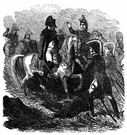Waterloo: Napoleon's Final Defeat
|

|
|
Share This Page
|
|
|
|
|
|
|
Follow This Site

|
 |
|
|
On June 18, 1815, the magnificent military career of Napoleon Bonaparte finally came to an end with his defeat at the Battle of Waterloo.
An ambitious soldier who had seized power during the reaction to the Revolution, Bonaparte was soon First Consul and then Emperor, ruling his country with an iron fist and an eye toward European domination. He raised the Grand Army of the Republic, a massive fighting machine, and bent it to his will, employing innovative and highly successful  tactics to keep the other nations of Europe off-balance enough and at each other's throats enough that the entire period of time has been named after him: the Napoleonic Era.
tactics to keep the other nations of Europe off-balance enough and at each other's throats enough that the entire period of time has been named after him: the Napoleonic Era.
For years, Napoleon had gotten the better of his English and Prussian counterparts. He had been captured and sent to the island of Elba, but he escaped and continued his escapades. He enjoyed even more success in his restoration to power. But it ended at Waterloo.
Just two days earlier, the French had defeated the Prussians at Ligny, in an effort to keep them from hooking up with an advancing English army commanded by the Duke of Wellington. It was against the English that Napoleon turned, at a small ridge at Mont St John, near Waterloo, a town in present-day Belgium.
The first signs of trouble arrived when it took 10,000 French troops to subdue little more than 2,000 British at the chateau of Hougoumont. Next, British cavalry under Lord Uxbridge surprised the French by charging a huge column of infantry, scattering it and claiming 5,000 French lives.
 The turning point of the battle came when French Marshal Ney mistook British redeployment for retreat and ordered a cavalry charge across muddy ground. The British were waiting with bayonets fixed and withstood charge after charge. In the meantime, the Prussians were advancing, not content to wallow in their defeat at Ligny.
The turning point of the battle came when French Marshal Ney mistook British redeployment for retreat and ordered a cavalry charge across muddy ground. The British were waiting with bayonets fixed and withstood charge after charge. In the meantime, the Prussians were advancing, not content to wallow in their defeat at Ligny.
The French held the line against the Prussians, but this action took valuable resources away from the struggle against the British. In desperation, Napoleon ordered his Imperial Guard into action. They advanced through the field of defenders, making steady progress and looking for all the world as if they were going to turn the day, when a group of 1,500 British soldiers stood up and fired point-blank into the advancing French troops. Stunned by the defenders' display of wanton disregard for their own lives, the Imperial Guard buckled and panicked, for the first time ever under Napoleon's command. The retreat became a rout, and Napoleon was finished--again.
This time, he was sent to St. Helena, an even more deserted island, where he died.